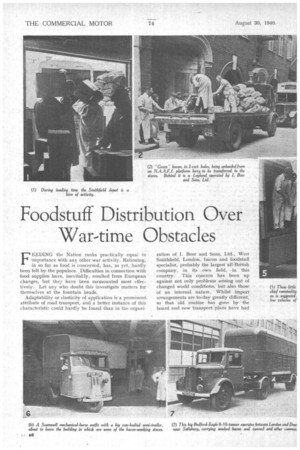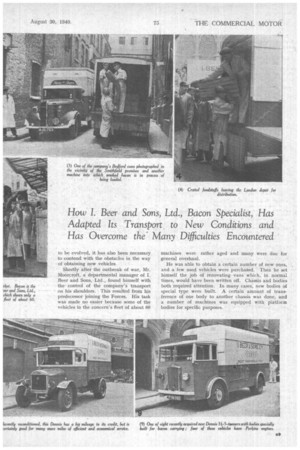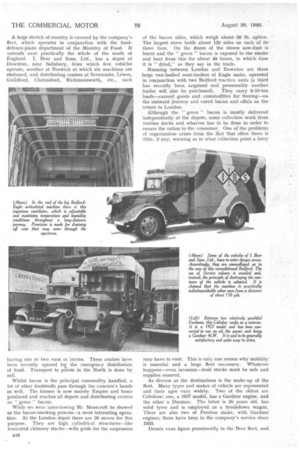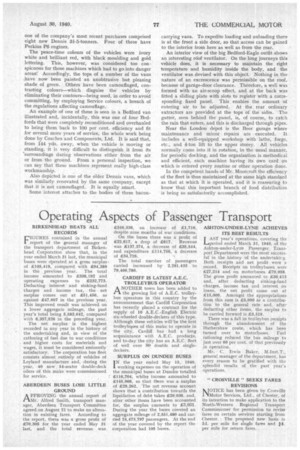Foodstuff Distribution Over War-time Obstacles
Page 26

Page 27

Page 28

Page 29

If you've noticed an error in this article please click here to report it so we can fix it.
How I. Beer and Sons, Ltd., Bacon Specialist, Has
Adapted its Transport. to New Conditions and Has Overcome the Many Difficulties Encountered FEEDING the Nation ranks practically equal in importance with any other war activity. Rationing, in so far as food is concerned, has, as yet, hardly been felt by the populace. Difficulties in connection with food supplies have, inevitably, resulted from European changes, but they have been surmounted most effectively. Let any who doubt this investigate matters for themselves at the fountain heads.
Adaptability or elasticity of application is a prominent, attribute of road transport, and a better instance of this characteristic could hardly be found than in the organi
zation of I. Beer and Sons, Ltd., .West Smithfield, London, bacon and foodstuff specialist, probably the largest all-British company, in its own field, in this country. This concern has been up against not only problems arising out of changed world conditions, but also those of an internal nature. Whilst import arrangements are to-day greatly different, so that old routine has gone by the board and new transport plans have had to be evolved, it has also been necessary to contend with the obstacles in the way of obtaining new vehicles.
Shortly after the outbreak of war, Mr. lVfoorcroft, a departmental manager of I. Beer and Sons, Ltd., found himself with thecontrol of the company's transport on his shoulders. This resulted from his predecessor joining the Forces. His task was made no easier because some of the vehicles in the concern's fleet of about 60
machines were rather aged and many were due for general overhaul.
He was able to obtain a certain number of now ones, and a few used vehicles were purchased. Then he set himself the job of renovating vans which, in normal times, would have been written off. Chassis and bodies both required attention. In many cases, new bodies of special type were built. A certain amount of transference of one body to another chassis was done, and a number of machines was equipped with platform bodies for specific purposes. A large stretch of country is covered by the company's fleet, which operates in conjunction with the fooddefence-plans department of the Ministry of Food. It extends over practically the whole of the south of England. I. Beer and Sons. Ltd., has a depot at Downton, near Salisbury, from which five vehicles operate, another at Norwich at which six machines are stationed, and distributing centres at Sevenoa.ks, Lewes, Guildford, Chelmsford, Rickmansworth, etc., each having one or two vans or lorries. These centres have been recently opened foi the emergency distribution of food. Transport to points in the North is done by rail.
Whilst bacon is the principal commodity handled, a lot of other foodstuffs pass through the concern's hands as well. The former is now mainly Empire and home produced and reaches all depots and distributing centres as " green " bacon.
While we were interviewing Mr. Moorcroft he showed us the bacon-smoking process—a most interesting operation. At the London depot there are 28 stoves for this purpose. They are high cylindrical structures—like truncated chimney stacks—with grids for the suspension of the bacon sides, which weigh about 56 lb. apiece. The largest stove holds about 120 sides an each of its three tiers. On the floors of the stoves saw-dust is burnt and the " green " bacon is exposed to the smoke and heat from this for about 48 hours, in which time it is " dried," as they say in the trade.
Running between London and Downton are three large van-bodied semi-trailers of Eagle make, operated in conjunction with twO Bedford tractive units (a third has recently been acquired and presumably another trailer will also be purchased). They carry 8-10-ton loads—canned goods and comniodities for tinning—on the outward journey and cured bacon and offals on the return to London.
Although the " green " bacon is mostly delivered independently at the depots, some collection work from various docks and wharves has to be done in order -to ensure the ration to the consumer. One of the problems of organization arises from the fact that often there is little, if any, warning as to what collection point a lorry may have to visit. This is only one reason why mobility is essential and a large fleet necessary. Whatever happens—even invasion—food stocks must be safe and supplies ensured.
As diverse as the destinations is the make-up of the fleet. Many types and makes of vehicle are represented and their ages vary widely. Two of the oldest are Caledons; one, a 1927 model, has a Gardner engine, and the other a Dorman. The latter is 20. years old, has solid tyres and is employed as a breakdown wagon. There are also two of Peerless make, with Gardner engines; these have been in the company's service since 1913.
Dennis vans figure prominently in the Beer fleet, and one of the company's most recent purchases comprised eight new Dennis 31-5-tonners. Four of these have Perkins P6 engines.
The peace-time colours of the vehicles were ivory white and brilliant red, with black moulding and gold lettering. This, however, was considered too conspicuous for those machines which had to go into danger areas'. Accordingly, the tops of a number of the vans have now been painted an unobtrusive but pleasing shade of green. Others have been camouflaged, contrasting colours—which disguise the vehicles by eliminating their contours—being used, in order to avoid committing, by employing Service colours, a breach of the regulations affecting camouflage.
An example of one of these is seen in a Bedford van illustrated and, incidentally, this was one of four Bedfords that were completely reconditioned and overhauled to bring them back to 100 per cent, efficiency and fit for several more years of service, the whole work being done by Coaches and Components, Ltd. It is said that, from 144 yds. away, when the vehicle is moving or standing, it i3 very difficult to distinguish it from its surroundings during observations either from the air or from the ground. From a personal inspection, we can say that these machines represent really high-class workmanship.
Also depicted is one of the older Dennis vans, which was similarly renovated by the same company, except that it is not camouflaged. It is equally smart.
Some interest attaches to the bodies of these baeon
carrying vans. To expedite loading and unloading there is at the front a side door, so that access can be gained to the interior from here as well as from the rear.
. An interior view of the big Bedford-Eagle outfit shows an interesting roof ventilator. On the long journeys this vehicle does, it is necessary to maintain the right temperature and humidity inside the body, and the ventilator was devised with this object. Nothing in the nature of an excrescence was permissible on the roof, because of garage-door clearance. Therefore, a well was formed with an air-scoop effect, and at the back was fitted a sliding plate with slots to register with a corresponding fixed panel. This enables the amount of entering air to be adjusted. At the rear ordinary extractors are provided at the tops of the sides. The gutter, seen behind the panel, is, of course, to catch the rain that enters, and this is discharged through pipes. Near the London depot is the Beer garage where maintenance and minor repairs are executed. It includes a well-equipped workshop with lathe, forge, etc., and 4-ton lift to the upper storey. All vehicles normally come into it in rotation, in the usual manner, for periodic docking, and the organization is methodical and efficient, each machine having its own card on which is entered every routine or other operation done. In the competent hands of Mr. Moorcroft the efficiency of the fleet is thus maintained at the same high standard as that at which it is operated, and it is reassuring to know that this important branch of food distribution is being so satisfactorily accomplished.




















































